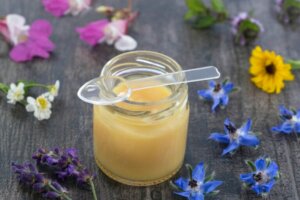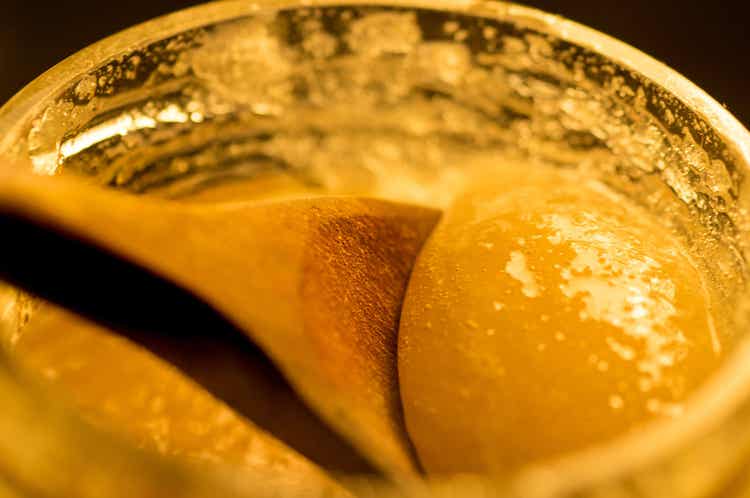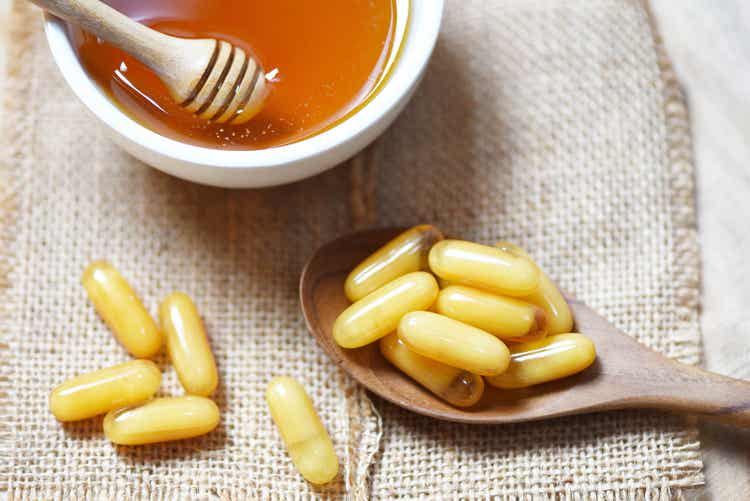Royal Jelly During Pregnancy: Is It Recommended?

Experts recommend royal jelly during many stages of life. That’s because it has essential nutrients and beneficial properties for health. In fact, people usually use it as a dietary supplement on a regular basis. However, the question we’re looking at today is whether experts recommend royal jelly during pregnancy.
Before we begin, we have to emphasize that not all honey contains royal jelly. It’s a compound specifically designed to feed larvae during their maturation stage. Also, it’s made by young worker bees between 5 and 10 days old. In addition, it has a yellow color and a sour taste.

Properties
Like we mentioned, royal jelly is a substance with beneficial properties for our health. In addition to providing a good amount of energy, it’s also capable of reducing feelings of fatigue. For that reason, experts recommend it for those who work high-intensity jobs.
Also, there’s some research that suggests that it may be an effective remedy to combat depression. In addition, it’s been proposed as an adjuvant agent for managing sclerosis or Alzheimer’s. However, there is disagreement about the latter.
What is clear is that it has antibiotic action that helps to prevent certain infections. Therefore, it can help to improve our immune response. Also, there are experts who say it can be used to help prevent osteoporosis.
Royal jelly during pregnancy
By now, you’ve definitely seen some of the beneficial properties of royal jelly. However, today we’re focusing on whether or not you can consume royal jelly during pregnancy.
The truth is that experts say women can consume royal jelly during pregnancy. There are no adverse side effects related to doing so that could endanger the health of the mother or the fetus. In fact, this food has several vitamins, minerals, and trace elements that can promote a healthy pregnancy. Therefore, it may even be recommended.
However, it’s always best to talk to your doctor first before starting any dietary supplement. That’s because there could be possible interactions with drugs or just as a simple precaution.
In addition, according to an article published in Oxidative Medicine and Cellular Longevity, this compound can help prevent gastrointestinal and dermatological issues. Both conditions tend to affect pregnant women, so royal jelly can help to reduce them.
Ways to eat royal jelly during pregnancy
There are two fundamental methods when it comes to consuming royal jelly. First, find honey that contains this compound. This will require choosing a high-quality product that you can then add to some dairy products or certain culinary dishes. However, you should be careful because women with gestational diabetes shouldn’t consume those types of products due to their sugar content.
The second option is to consume the royal jelly through dietary supplements that contain this compound. Generally, you can find it in ampoules or capsules. This option is the most comfortable one and has fewer contraindications.

Conclusion
As we’ve discussed, you can consume royal jelly during pregnancy. There are no side effects that will harm the health of the mother or the fetus, and it can also provide certain benefits. You’ll see these benefits at the gastrointestinal or dermatological level, as well as in your mood.
However, we always recommend talking to your doctor before starting to consume it. In addition, you should be adding it to a balanced and varied diet. Otherwise, you won’t be able to experience its full benefits.
Lastly, remember that royal jelly nutritional supplements are a better option than honey. That’s because supplements won’t cause any changes in your blood glucose levels.
Experts recommend royal jelly during many stages of life. That’s because it has essential nutrients and beneficial properties for health. In fact, people usually use it as a dietary supplement on a regular basis. However, the question we’re looking at today is whether experts recommend royal jelly during pregnancy.
Before we begin, we have to emphasize that not all honey contains royal jelly. It’s a compound specifically designed to feed larvae during their maturation stage. Also, it’s made by young worker bees between 5 and 10 days old. In addition, it has a yellow color and a sour taste.

Properties
Like we mentioned, royal jelly is a substance with beneficial properties for our health. In addition to providing a good amount of energy, it’s also capable of reducing feelings of fatigue. For that reason, experts recommend it for those who work high-intensity jobs.
Also, there’s some research that suggests that it may be an effective remedy to combat depression. In addition, it’s been proposed as an adjuvant agent for managing sclerosis or Alzheimer’s. However, there is disagreement about the latter.
What is clear is that it has antibiotic action that helps to prevent certain infections. Therefore, it can help to improve our immune response. Also, there are experts who say it can be used to help prevent osteoporosis.
Royal jelly during pregnancy
By now, you’ve definitely seen some of the beneficial properties of royal jelly. However, today we’re focusing on whether or not you can consume royal jelly during pregnancy.
The truth is that experts say women can consume royal jelly during pregnancy. There are no adverse side effects related to doing so that could endanger the health of the mother or the fetus. In fact, this food has several vitamins, minerals, and trace elements that can promote a healthy pregnancy. Therefore, it may even be recommended.
However, it’s always best to talk to your doctor first before starting any dietary supplement. That’s because there could be possible interactions with drugs or just as a simple precaution.
In addition, according to an article published in Oxidative Medicine and Cellular Longevity, this compound can help prevent gastrointestinal and dermatological issues. Both conditions tend to affect pregnant women, so royal jelly can help to reduce them.
Ways to eat royal jelly during pregnancy
There are two fundamental methods when it comes to consuming royal jelly. First, find honey that contains this compound. This will require choosing a high-quality product that you can then add to some dairy products or certain culinary dishes. However, you should be careful because women with gestational diabetes shouldn’t consume those types of products due to their sugar content.
The second option is to consume the royal jelly through dietary supplements that contain this compound. Generally, you can find it in ampoules or capsules. This option is the most comfortable one and has fewer contraindications.

Conclusion
As we’ve discussed, you can consume royal jelly during pregnancy. There are no side effects that will harm the health of the mother or the fetus, and it can also provide certain benefits. You’ll see these benefits at the gastrointestinal or dermatological level, as well as in your mood.
However, we always recommend talking to your doctor before starting to consume it. In addition, you should be adding it to a balanced and varied diet. Otherwise, you won’t be able to experience its full benefits.
Lastly, remember that royal jelly nutritional supplements are a better option than honey. That’s because supplements won’t cause any changes in your blood glucose levels.
All cited sources were thoroughly reviewed by our team to ensure their quality, reliability, currency, and validity. The bibliography of this article was considered reliable and of academic or scientific accuracy.
- Ahmad, S., Campos, M. G., Fratini, F., Altaye, S. Z., & Li, J. (2020). New insights into the biological and pharmaceutical properties of royal jelly. International Journal of Molecular Sciences. 21 (2): 382. https://www.ncbi.nlm.nih.gov/pmc/articles/PMC7014095/
- Botezan, S., Baci, G.M., Bagameri, L., Pasca, C., & Dezmirean, D. S. (2023). Current status of the bioactive properties of royal jelly: a comprehensive review with a focus on its anticancer, anti-inflammatory and antioxidants effects. Molecules. 28 (3): 1510. https://www.ncbi.nlm.nih.gov/pmc/articles/PMC9921556/
- Drugs.com. (29 de septiembre de 2022). Royal jelly uses, side effects & warnings. Consultado el 16 de junio de 2023. https://www.drugs.com/mtm/royal-jelly.html#what-to-avoid
- Maghsoudlou, A., Sadeghi Mahoonak, A., Mohebodini, H., & Toldra, F. (2019). Royal jelly: chemistry, storage and bioactivities. Journal of Apiculture Science. 63 (1). https://sciendo.com/article/10.2478/jas-2019-0007
- Memorial Sloan Kettering Cancer Center. (6 de julio de 2022). Royal jelly, purported benefits, side effects & more. Consultado el 16 de junio de 2023. https://www.mskcc.org/cancer-care/integrative-medicine/herbs/royal-jelly
- Paspuleti, V. R., Sammugam, L., Ramesh, N., & Gan, S. H. (2017). Honey, propolis and royal jelly: a comprehensive review of their biological actions and health benefits. Oxidative Medicine and Cellular Longevity. 1259510. https://www.ncbi.nlm.nih.gov/pmc/articles/PMC5549483/
This text is provided for informational purposes only and does not replace consultation with a professional. If in doubt, consult your specialist.








